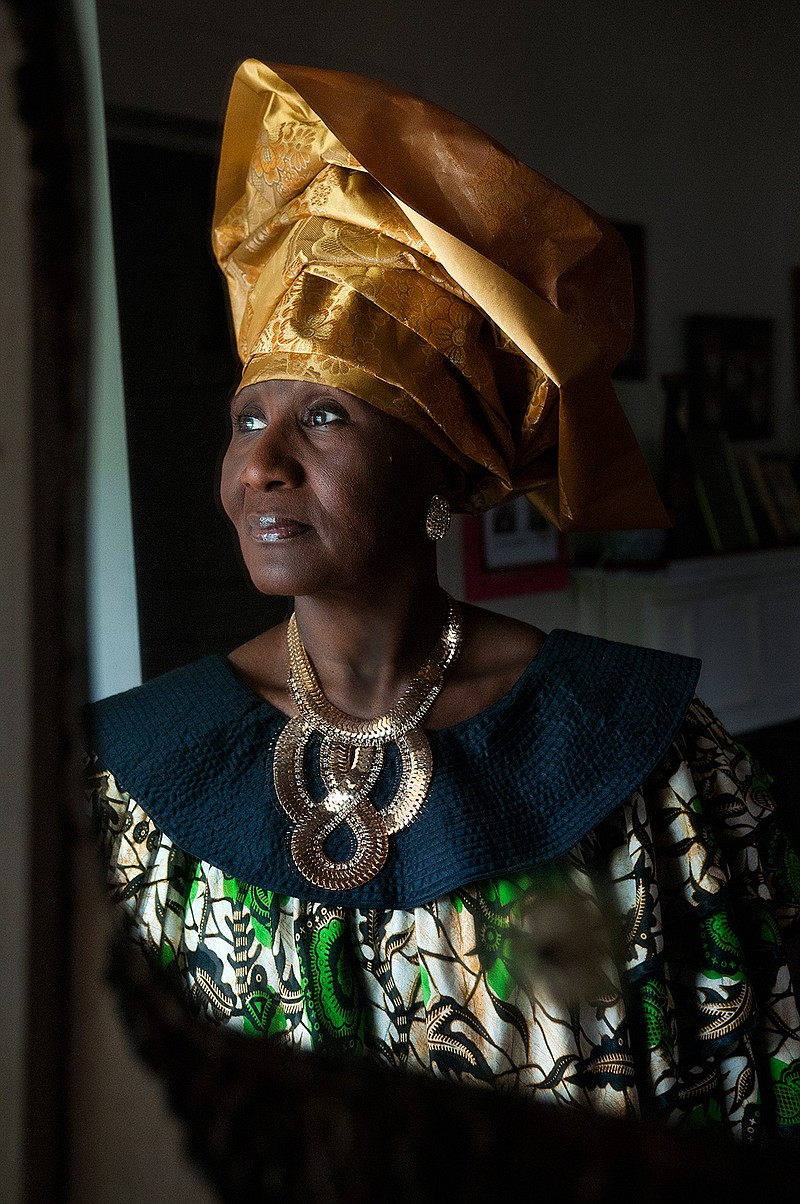If ever a shortlist of the most fashionable Texarkana women is made, Rhonda Dolberry surely belongs near the top.
You may know Dolberry through her community work with organizations like the Texarkana Regional Arts and Humanities Council's African-American Committee or the Texarkana NAACP branch.
She's worked on projects like an annual reader's theater and art exhibits showcasing the accomplishments of black Americans. Now retired, she dedicates much of her time to others, including eight grandchildren who like to visit her en masse.
Photo Gallery
Orlando Thomas
Orlando Thomas of Orlando's Personal Fitness. "Don't start out too big. That's why most people fall off of the wagon," he says.
Dolberry is one of the most recognizable people in town, from her ever-on point shoes to an impish smile and array of colorful hats. It's also in the pride she exudes. You sense it in her bearing and demeanor, which seem informed by both hard-won wisdom and playful confidence.
Rhonda's a serious woman who cherishes opportunities to look nice, whether it's donning a silver hat that looks part accordion or a vibrant red dress that recalls her African-American heritage.
And for Dolberry, who claims to be shy, her outer fashion sense reflects the big spirit that comes from inside.
In fact, when one of her youngest granddaughters inquired recently, as they sorted jewelry, why she wears these outfits, Dolberry said to her, "When I put my clothes on, it always makes me feel like I'm playing dress up as a kid."
Born in Nashville, Ark., young Rhonda came to Texarkana after her mother died when Dolberry was only 5 years old. There in Nashville with her grandmother and great-grandmother in a house full of people, she was she no stranger to being poor.
But she had a relative here, called Aunt Shug, who took her in. Living in Texarkana, Rhonda grew up with a neighbor girl, Leota Collins, living on the other side of the fence. They became friends and found adventures together.
"What we always did is we played mud cakes every day. We had our little stove and our little refrigerator stuff out there," Dolberry recalled. "And they had bought us these little high heel shoes. We called them Cinderella shoes. The kids still wear them now."
Rhonda and her friend wore those shoes and wore them out. During summers, they'd sit out on the porch, dressed up to watch the world (i.e., boys). She remembers the cool clothes back then. She'd see them on "American Bandstand." Her aunt could sew and make clothes for her.
"I always had a thing about shoes. Always," Dolberry said. She dreamed about buying shoes when she grew up. She loved color. Her aunt was a teacher with an artistic flair and craftiness. Rhonda picked up on it. She loved cookbooks, magazines, drawing and painting.
"It's just like the colors would speak to me," Dolberry said. Hence, the creative spirit of dressing up grew in her.
If you see her out on the town at community events, you might find her wearing turquoise leather boots. The first pair of this type she purchased was from Billy Sims' wife's State Line Ave. shop years ago, she says. Trying them on, it was like Cinderella all over again.
Dolberry can pair these boots with a black jacket ('70s-feel fringes included) and a cowboy hat that, taken all together, give her a Wild West flair. She's in the market for a full-fledged cowboy suit now, sequins included.
"I want the whole nine yards," Dolberry said about the Grand Ole Opry look.
Another skirt and top she wears has a definite African feel with patterns of greens and earth tones. Where did she purchase it? The J.C. Penney catalog. "It's another go-to piece. It wears well," she said. She wears it with a hat made of a gold-colored material ("pliable like paper") she can smooth out, pin and tie together. "It keeps its shape," she said.
Then there's the vibrant red outfit that makes Dolberry look like royalty or a visiting dignitary, all topped by a triangular hat. To her, it looks Egyptian with gold African details.
For Dolberry, dressing up is more than simply sporting a pretty dress. It's helped her get through some of her most difficult days, such as the months of 2007 when both she and her late husband faced cancer.
"When I went through the diagnosis with the cancer and the radiation and the chemotherapy, I think the one thing that kept me sane was the ability to where I would lay my stuff out-I mean, I had a reason to get up," Dolberry recalled. "I'd put on my makeup and I would lay my clothes out that's what helped me."
Dolberry retired from her work at the Department of Human Services when she was diagnosed. She'd worked on programs like Medicaid and food assistance. She did social services work, too. She's always done community work. She's a been a Sunday school teacher, too, and worked with kids. Her TRAHC work was a natural extension of this.
She's been forever drawn to African fashions. The colors, the patterns, the headdresses, the celebration of her identity, they all come together to speak to her.
"I've always had African pieces," Dolberry said. "It fits well with me. I think I wear it very well. Again, it just speaks to me. It's strong, it's vibrant, it's different, and I like being different. I don't mind standing out."
Saying that with a laugh, she then mentions her shyness. But to this shy person, though, dressing is an art. "I'm the canvas," she says.
Dolberry doesn't favor any brands or designers, although her friend Chiquita Burks orders some African outfits for her at her downtown shop. A former son-in-law was from Nigeria, so he brought her a few pieces. She looks for Afro-centric outfits in magazines, too, but she can find the styles she likes just about anywhere.
For her, it's important to connect what she wears to her heritage and be visible in the community.
"Going back to when I was growing up and just looking through magazines and recognizing and seeing faces that looked like me was really cool, or like when you saw stuff on TV, to emulate that," Dolberry said. She grew up on Ash Street, the Arkansas-side Sandflat Addition. She was surrounded by beauticians, school teachers, nurses, barbers and other small business owners in her neighborhood.
"We were always taught that when you go out somewhere you look a certain way," Dolberry said. It's about presenting yourself in a certain manner.
On the flip side, though, there was the racism of the Jim Crow South. Her uncle worked for a jewelry shop downtown. They weren't allowed to come through the front door, though. She remembers taking his lunch to him.
"I think it's real important that as an African-American woman that we know who we are, that you present yourself as such. Again, it's another part of our history," Dolberry said.
She doesn't like the idea of assimilating without recognizing one's culture. "You lose yourself," she said, comparing it to losing the stories that you tell. She remembers the conversations she'd have with her aunt while, as she sat on the floor, her hair was braided.
This sensibility is shown in how Dolberry dresses, too. Thinking of this, she's reminded of Maya Angelou and her stories.
"You are who you are," Dolberry says about the importance of those stories.
And for Rhonda Dolberry, what she wears remains an integral expression of who she is.


